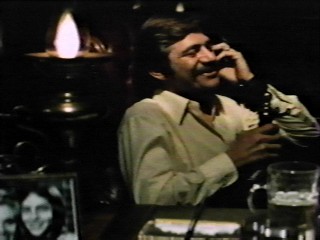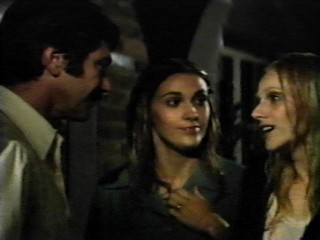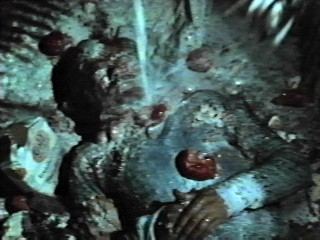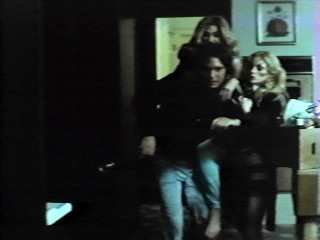
|
|
|
|
|
|
|
|
|
|
|
|
|
(1977) Director: Peter S.
Traynor
I can't call myself an expert on lesbianism - in fact, most of all the information I have learned on the subject through the years has been through various B movies. And if I am to believe what they claim on lesbianism, it is that the practitioners are, to one degree or another, hostile. In Cinderella, for instance, the chief incestuous lesbian gals are very mean to their stepsister. More extreme depictions of lesbian hostility can be seen in Naked Killer, where all of the principle female characters are both lesbians and violent killers. This reoccurring theme of hostility makes me wonder if the people who made movies are trying to tell me that we should be wary around lesbians. All I can say in response is that, personally, I find something about the subject of lesbians keeps me seeking out and watching movies with lesbian themes, the stronger the better. So it should come as no surprise that I found Death
Game to be a very interesting movie to watch, not just because
The movie tells us at the beginning that it's based on a true story, and that, "It should serve to remind us that fate allows no man to insulate himself against the evil which pervades our society," Since the movie takes place in 1975, but was filmed in 1974 (and not released for three years), I kind of have my doubts about the validity of the movie's first claim. You can make up your mind about the second claim after reading the following synopsis of the movie. In San Francisco, 40 year old George (Cassel) is celebrating his birthday with a romantic game of croquet with his wife, with the kids away in San Diego with her mother. Later in the day, her mother gives her a telephone call that gets her to drop everything to be with her children. George decides to stay - after all, all the fuss is just about the fact his young son had to be rushed to the hospital in order to get his appendix removed. That night, all alone in the house, hitchhikers Jackson
(Locke) and Donna (Camp) come to his home, both lost and wet from the
rain.
Feeling sorry for them, George invites them in to dry off. It isn't
long
before they get wet again - after the two discover This part of the movie could have been fashioned into a suspenseful thriller, but there doesn't seem to have been much of an attempt to do so. We never find out, for example, why Donna gets it in her head to scream and bang on the piano while George chases the mocking Jackson around the room (and getting slammed in the balls for his effort.) Nor do we find out why the women decide to tie George up, then smear makeup on their faces, scream some more, jump up and down on his bed while half-nude, pig out on food, and drop a heavy amount of flour and milk on George's face as somber music plays on the soundtrack. It does seem that there was some effort to portray these
women as insane by all of those (and many more) actions, but it still
comes
across as exploitation at its purest. I didn't mind it at all, because
this portrayal of insanity was so - well, insane - that it was
hilarious.
Locke and Camp are What screams even louder than both Locke and Camp is the amazingly awful direction, which result in a number of laughs by itself. Picture Locke and Camp's laughing and shaking heads side by side, while a red light shines from a source under their chins to try to make them look scary - it's even funnier than it sounds. Thought that bathtub orgy was hard to follow? Well, there are several other sequences where the camera is focused in on some kind of action, making them equally confusing to comprehend. There are a few places in the movie where it was obvious nobody was originally talking, but dialogue was very obviously dubbed in all the same. And I couldn't leave this subject without talking about the inappropriate use of the two songs on the soundtrack. The songs by themselves are horrible - "We're Home" sounds like bad James Bond, while the synthesized vaudeville-like song "Dear Old Dad" has lyrics like, "Who makes sure I wash my ears and take a bath? / Who wants me to walk along the straight and narrow path?" But both songs are played over and over, never fitting with any scene they are paired with. I will give credit to director Peter S. Traynor for one
aspect of his otherwise atrocious direction. It's with the ending he
provides
for the movie. Coming right out of the blue, Also reviewed at: Cold Fusion Video
Check for availability on Amazon (VHS) See also: Naked Killer, Revenge Of The Teenage Vixens..., Robotrix |
 of its strong depiction of lesbianism, but for the various violent acts
the lesbians in this movie dished out. Surprisingly, I also enjoyed the
movie not only on a different level, but more on that level. That is
because
Death
Game is so gloriously insane and ineptly made, that it's a
real
hoot to watch. At times it is so awful, you start wondering if it's
really
a cinematic joke, that the filmmakers were laughing like hell behind
the
camera while making it. I'm not totally sure which direction they were
going for, but I'm sure that those who love trashy and sleazy movies
will
enjoy this one.
of its strong depiction of lesbianism, but for the various violent acts
the lesbians in this movie dished out. Surprisingly, I also enjoyed the
movie not only on a different level, but more on that level. That is
because
Death
Game is so gloriously insane and ineptly made, that it's a
real
hoot to watch. At times it is so awful, you start wondering if it's
really
a cinematic joke, that the filmmakers were laughing like hell behind
the
camera while making it. I'm not totally sure which direction they were
going for, but I'm sure that those who love trashy and sleazy movies
will
enjoy this one.
 George has a
gigantic
bathtub, they get naked and drag him in, resulting in a three-way
that's
both erotic and hilarious, with the odd facial expressions on the three
as well as the constant cuts to tangled limbs and torsos while we hear
music that seems to have come from the TV show Lifestyles Of The
Rich
And Famous. Next morning, George tries to gently get them on
their way, but their carefree and fun-loving tones have all of a sudden
become darker - and getting darker by the minute. Eventually, George
finds
that they have become more than he can handle, and he finds himself
trapped
by two psychotic women who keep terrorizing him (when not on a break in
order to pleasure themselves.)
George has a
gigantic
bathtub, they get naked and drag him in, resulting in a three-way
that's
both erotic and hilarious, with the odd facial expressions on the three
as well as the constant cuts to tangled limbs and torsos while we hear
music that seems to have come from the TV show Lifestyles Of The
Rich
And Famous. Next morning, George tries to gently get them on
their way, but their carefree and fun-loving tones have all of a sudden
become darker - and getting darker by the minute. Eventually, George
finds
that they have become more than he can handle, and he finds himself
trapped
by two psychotic women who keep terrorizing him (when not on a break in
order to pleasure themselves.)
 atrocious, though
it's a bit unfair then to criticize
their overboard performances, since the director obviously didn't make
any effort to even partially restrain them. At least you can't say they
are boring for a minute, and they look great whenever the scene
requires
them to undress. Cassel (who looks like Charles Bronson's kid brother)
is more subtle in his performance, but this backfires to hilarious
extremes;
when he is helpless and tied up while the women run riot in his home,
the
strongest he comes across is an attitude that suggests mild annoyance.
atrocious, though
it's a bit unfair then to criticize
their overboard performances, since the director obviously didn't make
any effort to even partially restrain them. At least you can't say they
are boring for a minute, and they look great whenever the scene
requires
them to undress. Cassel (who looks like Charles Bronson's kid brother)
is more subtle in his performance, but this backfires to hilarious
extremes;
when he is helpless and tied up while the women run riot in his home,
the
strongest he comes across is an attitude that suggests mild annoyance.
 this ending is the
most -
how can I put it? Try as I might, I simply can't describe it properly.
The closest I can describe this ending is to mention the two
words
"original" and "flabbergasting". I won't say what happens in the
ending,
though I will mention that it seems to be a good clue to at least
whether
this movie was made with completely good intentions or not. Actually, I
don't think it really matters what direction the movie was intended to
go. What really matters is that whatever the intention was, Death
Game ended up being a hilarious exercise in excess and
ineptness.
this ending is the
most -
how can I put it? Try as I might, I simply can't describe it properly.
The closest I can describe this ending is to mention the two
words
"original" and "flabbergasting". I won't say what happens in the
ending,
though I will mention that it seems to be a good clue to at least
whether
this movie was made with completely good intentions or not. Actually, I
don't think it really matters what direction the movie was intended to
go. What really matters is that whatever the intention was, Death
Game ended up being a hilarious exercise in excess and
ineptness.